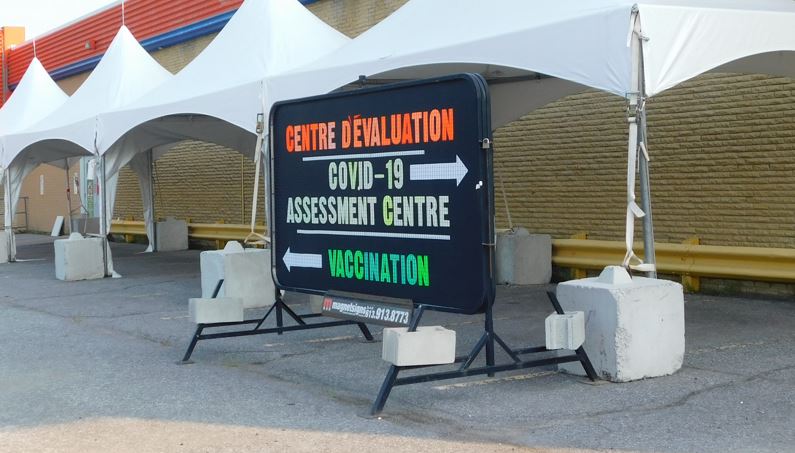“Those (past) resurgences will minimize as we get more people vaccinated,” said Dr. Paul Roumeliotis, during his regular media information session August 9.
The head of the Eastern Ontario Health Unit (EOHU) continued to focus attention on the need for more people to reschedule their vaccination appointments to earlier dates in August before the EOHU program of mass vaccination clinics ends this month. Right now EOHU vaccination statistics show that 80.8 per cent of the region’s population, ages 12 and up, have received their first dose of one of the COVID-19 vaccines and that 70.4 per cent of the population have received their second dose.
Everyone who has had two doses of vaccine will have, within two weeks of their last inoculation, “full protection status” against the risk of COVID-19 infection as their bodies’ immune systems become resistant to the virus and able to fight it off.
Regional vaccination goal
Vaccination totals in the 70-per-cent and 80-per-cent ranges are good but Dr. Roumeliotis and other regional health officials think they can be better to reduce or eliminate the new threat of the Delta variant and other COVID-19 mutations in the EOHU region.
“I’d like it to be at 90 per cent,” he said, referring to the second-dose figures. “That would give us a good ‘herd immunity’ against Delta.”
“Herd immunity” means that the greater the population total of residents with full immunization in the region, the less chance there is of either someone getting one of the variants from travelling outside the area and bringing it back to Eastern Ontario, or of someone coming in from outside the region, who has one of the variants, infecting a resident during their visit.
Delta variant
The Delta variant has made an appearance in the EOHU region within the past few weeks. But those cases are limited to six and Dr. Roumeliotis noted that the infected were isolated right away and are all now classed as “resolved” with the individuals recovering from their infection.
Dr. Roumeliotis also noted that the EOHU, like the rest of Ontario, had a small surge over the past weekend in the number of its active COVID-19 cases. Ontario overall had 400 new cases over the weekend, with 12 of them in the EOHU region. That pushed the region’s total active case figure to 16 for the August 9 summary.
Two of the cases required hospitalization, with one person needing intensive care unit treatment. Dr. Roumeliotis cited these new cases to support his urging residents to get their second dose of vaccine as soon as possible.
“I can tell you that these (12 cases) have been either unvaccinated or partly-vaccinated individuals,” he said.
Vaccination strategy
The EOHU mass vaccination clinic program ends August 27 but Dr. Roumeliotis affirmed that the health unit will continue to its vaccination strategy with a focus on getting “vulnerable individuals” protected. That includes scheduling “pop up” clinics in rural areas of the EOHU where residents have, for various reasons, been unable to attend one of the mass vaccination clinics held in the villages and towns. Dr. Roumeliotis noted that pharmacies will also continue to have COVID-19 vaccine available for people who want to make appointments for either their first or second dose.
The EOHU is working with school boards to ensure that students and staff in schools are vaccinated when schools reopen in September.
“We want to protect the vulnerable,” said Dr. Roumeliotis, when asked if he believed vaccination should be mandatory for staff and students at area schools. “My answer is yes.”
He explained that teachers and older students should be vaccinated to ensure that younger students, who may not be vaccinated yet for various reasons, are not put at risk. He said the same applies for all staff working in care homes, hospitals, and other facilities where there are seniors or people with weak immune systems.
No need for vaccine?
Since the pandemic began last year, many people contracted the virus before any vaccine existed. The question of whether those who survived COVID-19 infection are now immune remains unanswered.
Dr. Roumeliotis noted that there is still not enough information available yet to determine whether a person who survives COVID-19 infection now has a natural immunity against future infection. Studies are still in progress and he thinks “better safe than sorry” is the best strategy for former COVID-19 patients.
“People who had COVID should still get vaccinated,” he said.



